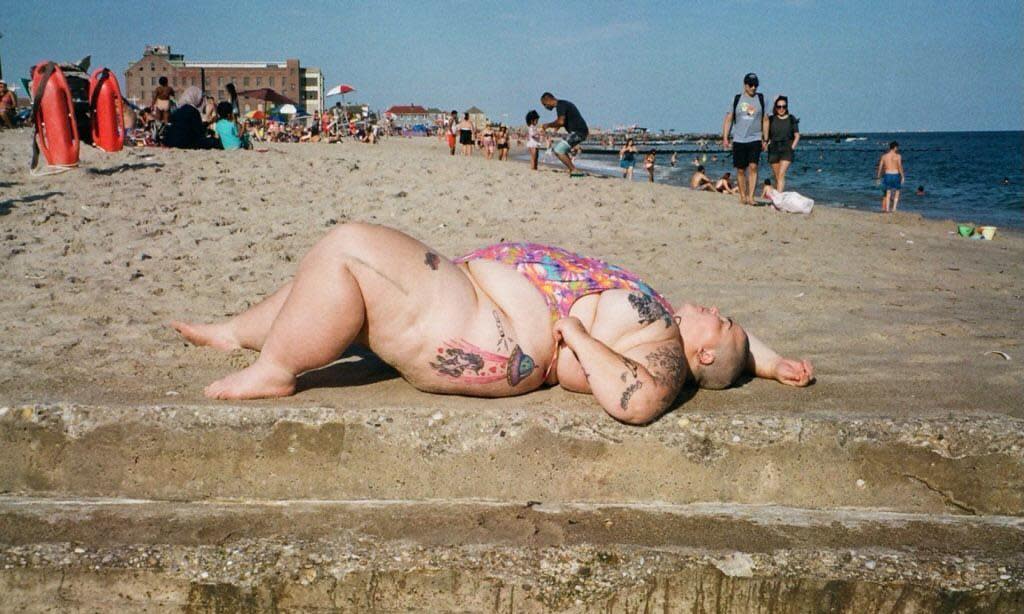New York’s Fat Beach Day gives plus-size people a space to be themselves

- Oops!Something went wrong.Please try again later.
Fat Beach Day events are springing up across the US in an effort to fight back against fat-phobia, reclaim safe spaces for the community and honor plus-size culture. Today, one of these celebrations is being held to coincide with Pride month at Jacob Riis Beach in New York, a location deeply ensconced in the city’s activism space.
“We’re going through something culturally that is impacting us every day on an individual level and a systemic level,” said Jordan Underwood, the event organizer. “We’re really trying to open up a space for people to be themselves.”
Underwood, a plus-size model, artist and activist, described being bullied for their weight as far back as middle school. Consistent hate, cruelty and harmful rhetoric from fellow students led to them setting up a blog at 12 years old, which became a place where they documented their experiences and made sense of what they were going through. In many ways, this marked the beginning of their journey into what they denote as “fat activism”.
Now, they organize events throughout New York City and work with Berriez, a vintage store “curated for curves” based in Brooklyn, to organize Fat Beach Day.
There may be rain, but the pair aren’t bothered. The day – featuring food, drinks and free sunscreen from Vacation – is something they’ve been looking forward to and planning for months.
“I’m so self-conscious at the beach, and I’m never around people that look like me,” said Emma Zack, who started Berriez in 2018. “I’m so excited we’ve created this space for other folks with bigger bodies to have a good time.”
In an era in which weight-loss drugs like Ozempic are deeply ingrained in mainstream diet culture, and thinness is resurgent as the ideal beauty standard, events like Fat Beach Day are becoming powerful tools in the fight against these norms. They have become not just events but calls to action – public stands against the societal pressures to conform to these shifting criteria.
Vogue Business reported that in the autumn/winter 2024 season across fashion weeks, only 0.8% of models were plus-size, and 3.7% were mid-size, a notable decline from previous years. A survey published by KFF in May found that about one in eight adults, or more than 15 million people in the US, had used a drug like Ozempic or Mounjaro at some point in their lives, highlighting the extent of this societal shift.
“In the 2000s, there was this anti-fat, intense cultural swing that really parallels what we’re going through right now,” Underwood said. “It’s indisputable how insidious the fat-phobia was in that decade. Britney Spears and Jessica Simpson, both then a size six, were plastered all over the tabloids, accompanied by headlines that used words like ‘fat’.”
For the next few months, like-minded communities across the US have planned other Fat Beach Days. A Fat Friends Pool Party is taking place in Chicago on 13 July. There will also be a Bellies Out Beach Day in Los Angeles in a few weeks.
“Fat bodies and Riis are a match made in heaven,” said Kleo Alana, one of the people attending the New York event today. “Jordan Underwood and Berriez have brought heaven to Queens.”
For decades, Jacob Riis Beach, named after a social reformer and photojournalist, has been an iconic and popular gathering place for the LGBTQ+ community. Also referred to as “the people’s beach”, it’s become a cultural and social landmark in the city’s history.
More broadly, New York has, for decades, been at the heart of the fat acceptance movement. In the 1960s, about 500 protesters held a “fat-in” in Central Park, burning diet books and photographs of the supermodel Twiggy, to publicly encourage body positivity and liberation.
In recent years, after organized activism, legislation has been passed to prohibit weight discrimination. New York’s mayor, Eric Adams, signed a bill in 2023 to ban weight discrimination in hiring and housing. Until then, you could be fired in New York for being overweight.
Despite this, stigmatizations still exist, and are at their most pervasive on social media.
“It’s a really shitty time, not just on the internet but in society, to be fat, and it feels really violent in a lot of ways,” Zack said. “You’d think it wouldn’t be such a thing because New York is so open, and you dress however you want. I always say I never realized how much people hate fat people until I got TikTok.”

